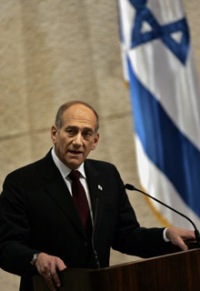Ehud Olmert:"Israel is prepared to make far-reaching compromises"
Prime Minister Ehud Olmert marked Israel's annual memorial day for fallen soldiers Monday with a new call for peace, saying his country was prepared to make "far-reaching compromises".

But he also sounded a defiant note after a weekend of fighting that left nine Palestinians dead. The Israeli leader said his country would hit militants "until they are destroyed."
Olmert's speech was an effort to strike a balancing act between appealing for peace and projecting strength on a memorial day made especially poignant by the deaths of 119 soldiers in last summer's war in Lebanon.
Olmert recently started a round of talks with the moderate Palestinian president, Mahmoud Abbas, in hopes of jump-starting peace efforts. At the same time, Israel has pushed forward with its war against Palestinian militants.
Speaking at a nationally televised ceremony, Olmert said the country owed it to its fallen soldiers to continue "the vital effort to achieve the peace we long for" and to "seriously consider every diplomatic initiative."
The 22-country Arab League recently renewed a 5-year-old initiative offering Israel peace with the Arab world in return for giving up all of the territories it captured in the 1967 Mideast war. The plan also calls for a solution for Palestinian refugees and their millions of descendants.
Israel objects to a full withdrawal to the pre-1967 lines and has ruled out return of refugees to former homes inside Israel. Nonetheless, Olmert has welcomed the Arab plan as a basis for negotiations.
"We will respect those of our neighbors who desire peace with us," Olmert said at a second ceremony Monday for Israeli civilians killed in Arab attacks. Israel would "discuss diplomatic agreements and the future of the ties between us with goodwill and readiness to make painful concessions," he said.
But referring to militants targeting Israelis, Olmert said Israel "will never cease to pursue them and strike at them until they are destroyed."
Nine Palestinians were killed in fighting with Israel over the weekend. Most of the dead were militants, but Palestinians said at least two civilians, including a 17-year-old girl, were killed.
The upswing in violence drew calls from Palestinian moderates for Abbas to cut off contacts with Olmert, while the Islamic militant group Hamas, which leads a coalition government with Abbas' Fatah, called for renewed attacks against Israelis.
In his memorial day speeches, Olmert also mentioned possible prisoner swap deals for the release of an Israeli soldier held by Hamas-linked militants in Gaza and for two others held by Hezbollah guerrillas in Lebanon.
Olmert said freeing the soldiers was deeply important to the government, but it would not repeat "mistakes made in the past" by releasing violent prisoners who then carried out more attacks against Israelis.
But Olmert said there would be "no escape in the end from making a difficult decision" on trading prisoners for the captured Israeli troops.
In Lebanon, a top Hezbollah official on Sunday said U.N.-mediated negotiations on a prisoner swap are going on in a "serious" manner, but there have been no results.
Also Monday, the Palestinians' top security official, Interior Minister Hani Kawasmeh, submitted his resignation during a Cabinet meeting, saying he was unable to carry out his plan to bring law and order to the chaotic Palestinian territories. But Prime Minister Ismail Haniyeh refused to let him step down, senior officials said.
Officials said Kawasmeh had grown frustrated over the delays in moving forward with his plan, which called for reforms in the numerous Palestinian security forces.
Palestinian Information Minister Mustafa Barghouti said Kawasmeh has complained about a "lack of cooperation" from security chiefs.
Kawasmeh also has complained that he has not been given sufficient decision-making powers, said Mohammed Madhoun, an aide to the prime minister.
Since Kawasmeh decided to remain on the job, the move was seen more as a pressure tactic on Palestinian leaders than an open threat.
The interior minister holds an extremely sensitive post, overseeing many of the security forces, and Hamas and Fatah argued for months over who would hold the position in their unity government before settling on Kawasmeh, an independent who was a little known bureaucrat.
Subscribe to Pravda.Ru Telegram channel, Facebook, RSS!

